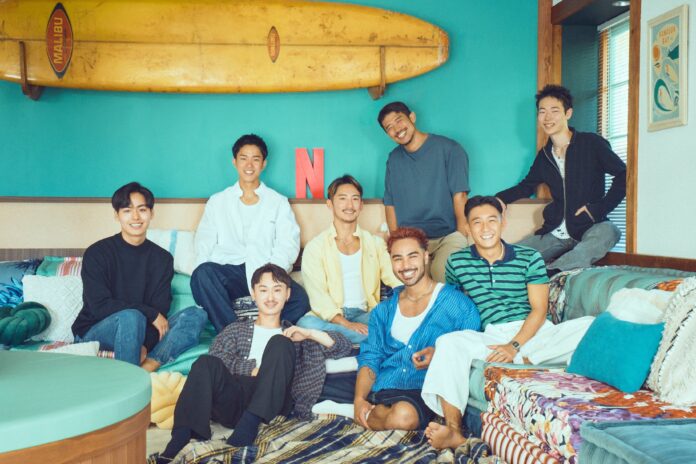
Charming and sometimes heartbreaking, the new reality series, “The Boyfriend,” now available on Netflix, has a handful of bi and gay Asian men living in the “Green Room” — a fabulous home where “anyone can fall in love with anyone.” And, over the course of 10 episodes, they do. What makes this show so bingeable is how the guys present themselves. Many of them are shy and respectful; their attractions ebb and flow mostly in small intimate moments where the guys courageously open their hearts.
The show is noteworthy for being the first queer Japanese reality series. Nine men in total come to live in the house over the course of the season. The early episodes focus on the possible romance between Dai, a 22-year-old student, who is smitten with Shun, a moody 23-year-old artist. This would-be couple navigates the ups and downs of their relationship over several episodes, dealing with jealousies, rebuffs and mixed messages. All this drama is periodically interrupted by five hosts — Megumi, Chiaki Horan, Thelma Aoyama, Yoshimi Tokui and drag performer Durian Lollobridgida — who comment enthusiastically on the action. (The interruptions are more fun than distracting, especially when a housemate says or does something that is analyzed for all its implications).
“The Boyfriend” has the housemates working a coffee truck which creates an opportunity for one selected guy to choose his coworker in order to spend alone time together. This system allows Kazuto, a 27-year-old chef, to decide between three of the guys who have expressed interest in dating him. They are Alan, a 29-year-old IT employee; Usak, a 36-year-old go-go dancer; and Ryota, a 28-year-old model. Kazuto is flattered but troubled by all the attention he receives — two other housemates reveal their interest in him over the course of the show — and it is gratifying to see how respectful he is of his housemates, especially when he selects one guy for a sleepover date.
The best sections of the series allow the characters to express themselves. There are misunderstandings, as when Gensei, a 34-year-old hair and makeup artist, thinks Ryota is into him. There are poignant moments where Usak talks about his difficulty fitting in with the group or being his true self. In addition, Kazuto describes his feelings of guilt and shame given his parents’ expectations of him and Shun talks candidly about being abandoned by his mother.
What is refreshing about “The Boyfriend” is how the guys all get along, even if they are sometimes “competing” for love. The biggest “argument” is a discussion Dai initiates about Usak spending the bulk of their allotted food money on chicken for his smoothies. They have calm talks and Usak thanks Dai for raising the issue.
But the show also records the painful reactions when one guy doesn’t choose someone who is crushed on him. A talk about “why I didn’t choose you” is revealing for one potential couple, who agree to stay in the friendzone. And there are tears when one of the housemates leaves (for work abroad) at the end of the fifth episode — but not without telling the man he has fallen for how he feels. Moreover, he encourages his housemates to “cherish the opportunity to share your feelings.” This inspires one of the guys to declare his love for another.
With this development, Ikuo, a 22- year-old food worker, joins the Green Room. Ikuo talks about love at first sight — and sets his eyes on one of the guys, creating more romantic conflict. Ikuo also developed a fast friendship with someone that helps define another relationship. That all this occurs in an organic fashion is why “The Boyfriend” is so addicting.
Alas, one cast member, Taehoen, an adorable 34-year-old designer from Korea, is not prominently featured in the romantic pairing. He does get the spotlight on a few rare occasions — once when he counsels a housemate to apologize to a possible romantic partner for behaving badly, and again when the group gathers to discuss being out to their families. While Ryota acknowledges that he came out to his mother after being cast on the show, Taehoen claims he has not broached the subject yet. The scene provides some perspective on how life is for members of the LGBTQ community in Asia. Moreover, the hosts talk about issues of acceptance of sexual identity in Japan as well.
As for who couples up in the end, the last two episodes of “The Boyfriend” dropped on July 30 and were not available for preview in time for this review. But before the series finale, several couples pair up for dates, and one features the series’ first kiss — an exciting moment for both the characters and viewers.
It is easy to become invested in the lives and loves these men share as they yearn for romance and sometimes experience disappointment. The guys are all polite and considerate, and watching them communicate their emotions is endearing. It makes “The Boyfriend” sweet and gentle, making it hard not to love this show.
